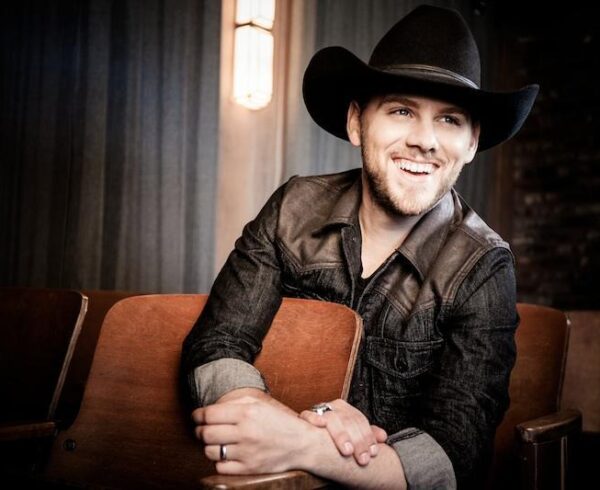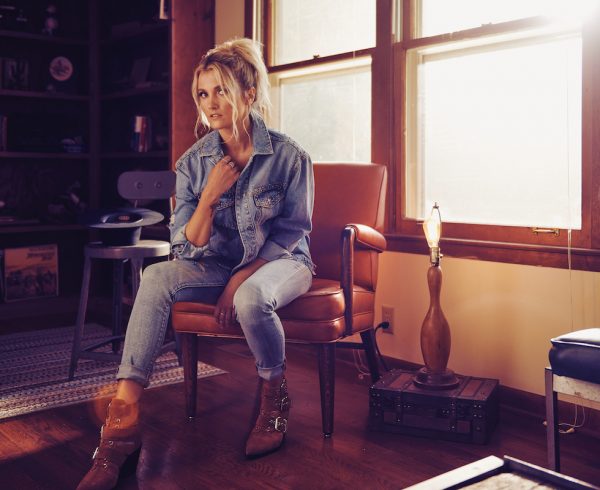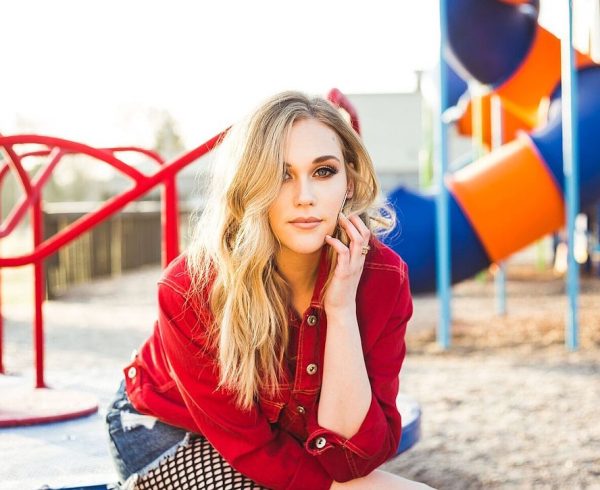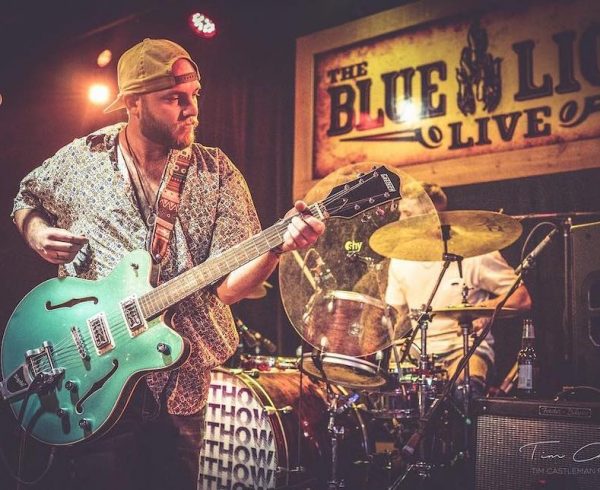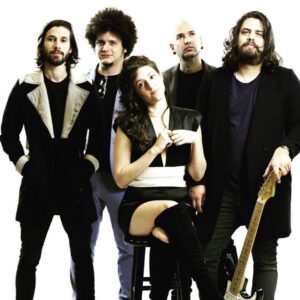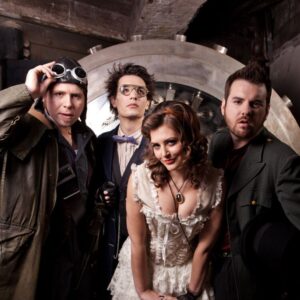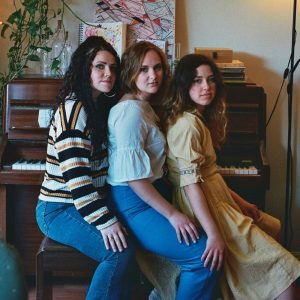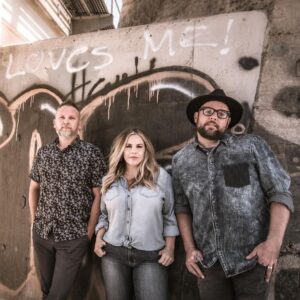Skillet Drummer Jen Ledger Steps Into The Spotlight With Debut EP
Jen Ledger was just 16 years old when she moved from Conventry, England, to the United States. It was a Christian music school in Wisconsin that brought her to the U.S. It was a happenstance meeting with popular rock band Skillet (and some amusing misunderstandings) that’s kept her here ever since.
In this SCENES interview, Ledger talks about her unique journey to rock stardom, why she decided to record her debut solo EP Ledger, how band mates John and Korey Cooper have helped her every step of the way, and how her own personal insecurities have been a blessing in disguise.
SCENES: You had an unusual entry point into the rock music business. Explain how that all went down.
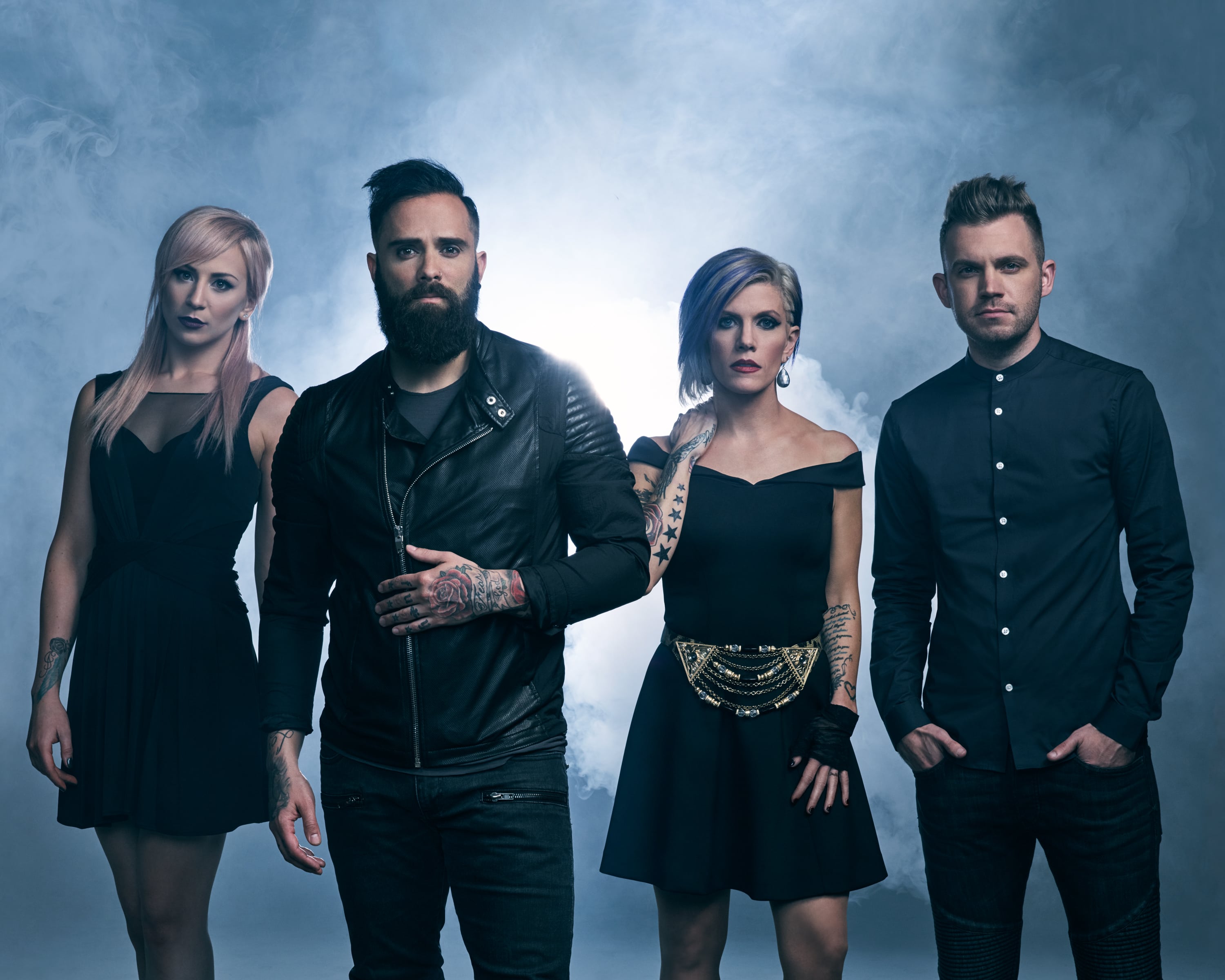 JEN LEDGER: When I came to the U.S., I only intended to stay for about 10 months. I continued for a second year at the school because I loved it so much. About 13 months into my time here, that’s when Skillet was holding auditions. They had heard that I played. I was part of this national competition in England called “Young Drummer of the Year” and I made it to the finals. I guess rumor had gotten to the Coopers that I had played, and because they’d had a girl drummer before me, I think that Korey especially wanted me to tryout, but John Cooper really didn’t. He wanted to have someone that wasn’t green. He wanted a professional. And I think they’d already auditioned some session musicians from Chicago. At the time, he thought I was 21 and that was way too young. He didn’t want to deal with someone so young getting in the band while they were well established at that point. When they asked me to tryout, I actually said no because I’d become really insecure. I was around a lot of male drummers that were incredibly flashy and I think I just compared myself and it made me think surely I wasn’t cut out for this because I didn’t play like them. I was the girl who felt sick and was so nervous playing for 200 people on a Sunday morning at church. It was too much pressure. So the idea of trying out for this successful touring rock band, it was like, there’s no way. No thank you. But honestly, after praying about it, I felt like I was supposed to tryout. The tryout went really well. I was so concerned that I’d misrepresented myself that I almost tried to sabotage myself after the tryout.
JEN LEDGER: When I came to the U.S., I only intended to stay for about 10 months. I continued for a second year at the school because I loved it so much. About 13 months into my time here, that’s when Skillet was holding auditions. They had heard that I played. I was part of this national competition in England called “Young Drummer of the Year” and I made it to the finals. I guess rumor had gotten to the Coopers that I had played, and because they’d had a girl drummer before me, I think that Korey especially wanted me to tryout, but John Cooper really didn’t. He wanted to have someone that wasn’t green. He wanted a professional. And I think they’d already auditioned some session musicians from Chicago. At the time, he thought I was 21 and that was way too young. He didn’t want to deal with someone so young getting in the band while they were well established at that point. When they asked me to tryout, I actually said no because I’d become really insecure. I was around a lot of male drummers that were incredibly flashy and I think I just compared myself and it made me think surely I wasn’t cut out for this because I didn’t play like them. I was the girl who felt sick and was so nervous playing for 200 people on a Sunday morning at church. It was too much pressure. So the idea of trying out for this successful touring rock band, it was like, there’s no way. No thank you. But honestly, after praying about it, I felt like I was supposed to tryout. The tryout went really well. I was so concerned that I’d misrepresented myself that I almost tried to sabotage myself after the tryout.
“Yeah I almost quit playing the drums because I’ve become so nervous and I really hate playing in front of people. If I don’t get in this band I’ll probably never play again. It’s become a big insecurity for me. But if God has this planned for me, I’ll give my all to it.”
The Coopers and I have such a similar heart and such a similar faith and passion that they chose to go with me. For me, it felt very clear. It felt like it lined up in a destiny way—not to sound cheesy. But it seemed clear that this was what I was supposed to be doing. So I stepped into Skillet and they had no idea I was 17 at the time. At the end of the audition, they told me they’d be calling me back soon and asked me what I’d be doing for the couple of weeks.
I told them, “Actually, I’m going to be having a birthday.”
John asked, “Oh are you going to be 21, 22?”
And I said, “Oh no. I’m going to be 18.”
I remember his jaw pretty much hitting the floor and then he found out I’d only been playing for four years.
“If I had known any of these details, I would never have let you tryout!”
It’s so cool how everything lined up. It felt like a destiny thing. So stepping into Skillet, I was 18 years old. I had just moved to America 13 months before. I was a kid. They were teaching me about sound checks and how to tour and how to take care of my gear and how to play in studios and arenas. Everything was changing. But on top of that, they were teaching me how to pay my bills and how to drive a car. There were basic adulting skills they were teaching an 18-year old at the same time. They obviously had a ton of patience and they took a massive chance by choosing me to be their drummer. Now 10 years later, it’s surreal to see what I’ve been able to do—even just overcoming that fear from myself—by stepping out and doing things that frighten you. I’ve toured the world with this multi-platinum selling rock band and I’m speaking to you about my own solo project. My own dream was to be a hairdresser and I’m really glad that I stepped out and allowed myself to be stretched into things that felt too big and too scary for me.
SCENES: Can you point to a time during the process where you crossed a threshold and overcame the stereotypical reactions a lot of female drummers get?
 JEN LEDGER: I don’t know. I know that the Skillet fans are some of the most loyal and passionate fans in the whole world. At first there was a resistance because I was replacing a really adored drummer, Lori Peters. No one likes change. There were people that were upset that I was there. But quickly, the Skillet fans really embraced me. As far as women and drumming in general, I’ve seen it my whole life. The reason I quit drums was because I felt stupid and I hated the gimmick of it. I didn’t play like the guys around me. I experienced that and it has struck me down. Even when I was in Skillet and there are times when you step onto the rock stage and people don’t know who you are. Korey and I have dealt with this. The band is actually quite pretty. We’re like the Backstreet Boys of the rock world. Because there are two girls, you can sense the lack of excitement when we walk out there. In the same 20 minutes, we’ve sensed the same turnaround of, “Oh they can play. Oh these chicks can play.” There’s something thrilling about going up there and knowing you’ve got something to prove. Would I rather not experience that? Of course not. But if you let it fire you rather than defeat you, than that can go a long way. I don’t feel like there’s a stigma anymore. There are just so many women now that are freaking excellent. There’s just no denying it anymore. But there is a fine line. The stereotype is still here but we’re also living in a new season where the work stands for itself. The Internet has changed everything. Everyone has access to the excellence that’s out there.
JEN LEDGER: I don’t know. I know that the Skillet fans are some of the most loyal and passionate fans in the whole world. At first there was a resistance because I was replacing a really adored drummer, Lori Peters. No one likes change. There were people that were upset that I was there. But quickly, the Skillet fans really embraced me. As far as women and drumming in general, I’ve seen it my whole life. The reason I quit drums was because I felt stupid and I hated the gimmick of it. I didn’t play like the guys around me. I experienced that and it has struck me down. Even when I was in Skillet and there are times when you step onto the rock stage and people don’t know who you are. Korey and I have dealt with this. The band is actually quite pretty. We’re like the Backstreet Boys of the rock world. Because there are two girls, you can sense the lack of excitement when we walk out there. In the same 20 minutes, we’ve sensed the same turnaround of, “Oh they can play. Oh these chicks can play.” There’s something thrilling about going up there and knowing you’ve got something to prove. Would I rather not experience that? Of course not. But if you let it fire you rather than defeat you, than that can go a long way. I don’t feel like there’s a stigma anymore. There are just so many women now that are freaking excellent. There’s just no denying it anymore. But there is a fine line. The stereotype is still here but we’re also living in a new season where the work stands for itself. The Internet has changed everything. Everyone has access to the excellence that’s out there.
SCENES: What inspired you to record a solo EP?
JEN LEDGER: It’s probably been about six years that it’s been in my heart to do it. I’ve been traveling all over the world and meeting people that speak all different languages. The language barrier seems to be broken by music. I’ve had people tell me they were going to kill themselves and then they heard the song “The Last Night” or they were addicted to heroin and our music has helped them stay clean. You meet people face to face that music has actually empowered them and saved their lives. There was also a stirring in my heart after hearing so many young girls had learned to play the drums because of me or they changed their hair because of me. It sounds kind of goofy, but I was humbled by the power and the influence that the platform in Skillet had given me. I was looking around and seeing that biggest thing that shapes the younger generation is reality TV stars or Disney stars gone wild. There are a lot of people that are broken and hurt and the loudest voices are the ones that the younger generation is copying. If people are looking to me in a similar way, why not embrace this platform I’ve gotten and be more vocal with it and speak out more and hopefully be a source of light and source of something that lifts people up rather than brings them down. That’s exactly why I decided I wanted to write this solo project.
SCENES: Would you agree that, from a business perspective, it might seem like a risky move for the Coopers to allow their drummer to get pushed out front with a solo project?
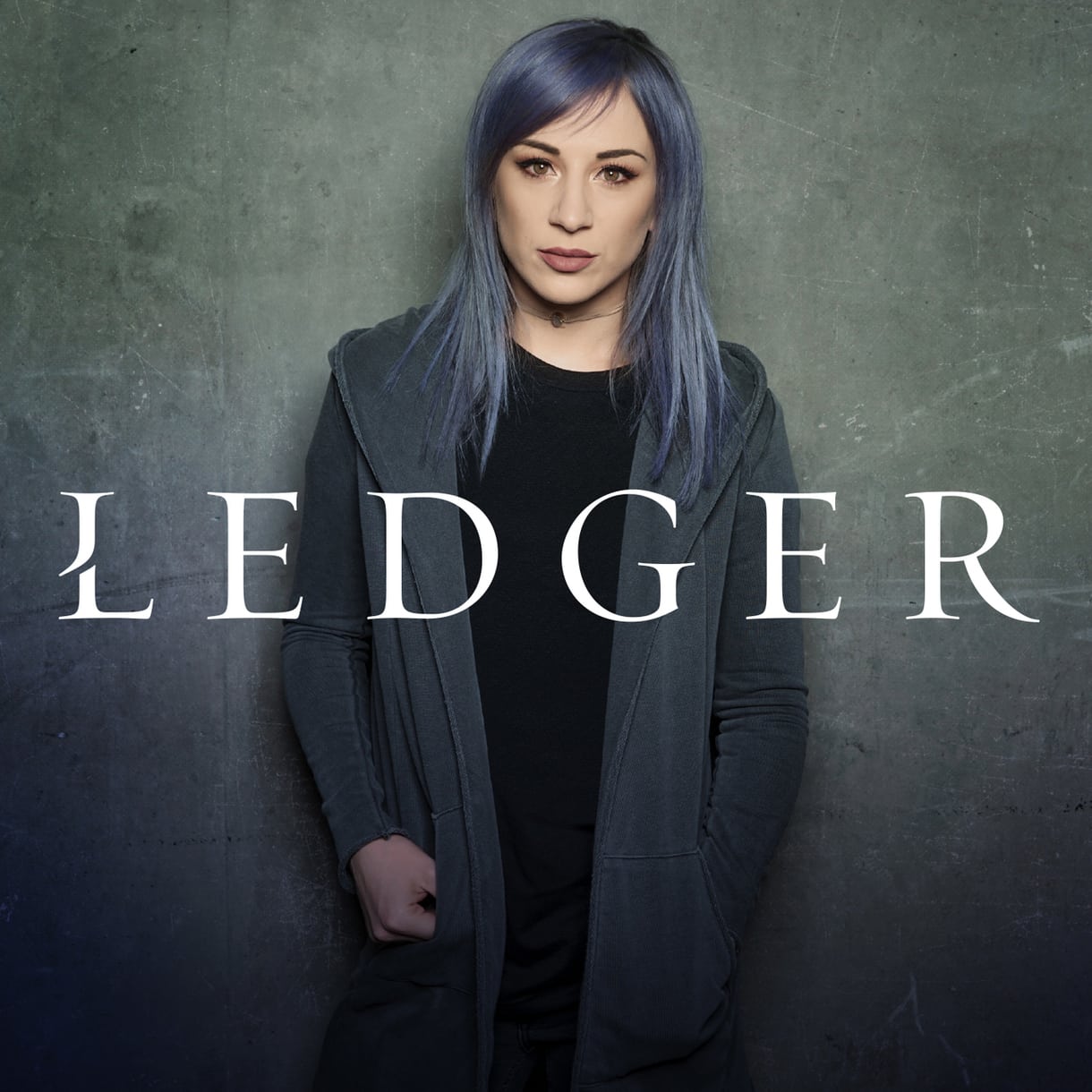 JEN LEDGER: You are totally right. You would think there would be some sort of feeling of being threatened like, “Do you not want to be here?” Instead, the Coopers see how music changes the world and they’re people that live their lives to be a light and to be a source of hope. They don’t see things the way other people would. It’s such a clear picture of how incredible they are as people. They’re some of the most generous people. They’re the same off stage as they are on stage. People would be blown away if they saw the kind of lives that they lived. They’re radical people and they’re passionate people. It speaks louder than words can. They should never have picked me 10 years ago. There were easier picks. They’re people that have faith and take risks and they don’t really care what the natural problems could be. Why would you ever pick an 18-year old girl who knew nothing about touring and didn’t even know if she liked the drums? They just see things differently than other people. They’re willing to step out in faith and take risks.
JEN LEDGER: You are totally right. You would think there would be some sort of feeling of being threatened like, “Do you not want to be here?” Instead, the Coopers see how music changes the world and they’re people that live their lives to be a light and to be a source of hope. They don’t see things the way other people would. It’s such a clear picture of how incredible they are as people. They’re some of the most generous people. They’re the same off stage as they are on stage. People would be blown away if they saw the kind of lives that they lived. They’re radical people and they’re passionate people. It speaks louder than words can. They should never have picked me 10 years ago. There were easier picks. They’re people that have faith and take risks and they don’t really care what the natural problems could be. Why would you ever pick an 18-year old girl who knew nothing about touring and didn’t even know if she liked the drums? They just see things differently than other people. They’re willing to step out in faith and take risks.
SCENES: What were the life experiences that you were able to bring to the table when writing lyrics for this project?
JEN LEDGER: I haven’t gone through anything horrifying. I sometimes felt like, “I don’t have that cool of a back story. I don’t something to talk about like some other people.” But something I’m learning is that I’ve had to overcome myself, my own fears, my own insecurities. In a culture where we’re immersed in social media and comparison, this is something that most people can relate to now. I didn’t want to try out for Skillet because I was too afraid and I even went through a weird season a few years ago where I started struggling with anxiety and panic attacks. I was waking up in the night and just feeling really afraid. I’d never gone through anything like that and it didn’t line up with my character. I didn’t know what the heck was going on. After wrestling through that season and being disoriented, I felt like it was over and wasn’t going to happen again, but then last year, one night I was on stage with Skillet and I started to feel those panicky feelings again. I came offstage and I felt so defeated. It was right when the Ledger project started taking shape and we were making plans for a release. I remember thinking how on earth could someone like me, who still struggles with these feelings, ever step out and do something like this. It makes you feel disqualified and it makes you feel like you shouldn’t ever try. I remember telling Korey, “What if this is something that doesn’t go away for me?” I was almost asking if this stops me from being that person that I know I’m supposed to be. And she looked at me and said, “Then you fight Jen. While there’s breath in your lungs and until the day that you die, you fight. You do not let fear rob you of your life or rob you of stepping into your own destiny.” At that moment, I realized it’s okay to struggle. It’s okay if I’m not perfect. The one thing I can’t do, though, is let these things hold me back and stop me from living and stop me from stepping out. That’s what most of the themes on the EP are about.
SCENES: What was the inspiration for the lead single “Not Dead Yet.”
 JEN LEDGER: The song “Not Dead Yet” is actually about that conversation with Korey. It’s that realization that I will fight even if these things come back. They might not ever come back. I might have beat them. But if they do come back, I’m not going to let them disqualify me or take me out and stop me from running and living my life to the fullest. This generation has the most people diagnosed with anxiety and depression. I’m kind of grateful I went through that weird season because it’s what the majority of young people are going through and facing. Learning not to let it hold you back is massive right now. We’re just already flooding our own minds with social media and comparison and making yourself feel like you’re behind, and if you don’t have success and wealth than somehow you’re behind, and it’s just not the truth. It’s okay if you’re not perfect. It’s okay if you have struggles but you can still live life to the fullest and embrace what you have. I’m hoping the EP can empower people to take those steps.
JEN LEDGER: The song “Not Dead Yet” is actually about that conversation with Korey. It’s that realization that I will fight even if these things come back. They might not ever come back. I might have beat them. But if they do come back, I’m not going to let them disqualify me or take me out and stop me from running and living my life to the fullest. This generation has the most people diagnosed with anxiety and depression. I’m kind of grateful I went through that weird season because it’s what the majority of young people are going through and facing. Learning not to let it hold you back is massive right now. We’re just already flooding our own minds with social media and comparison and making yourself feel like you’re behind, and if you don’t have success and wealth than somehow you’re behind, and it’s just not the truth. It’s okay if you’re not perfect. It’s okay if you have struggles but you can still live life to the fullest and embrace what you have. I’m hoping the EP can empower people to take those steps.
SCENES: Having spent so many years behind the drums, what was your process in developing stage presence?
JEN LEDGER: I’ve been on a 10-year apprenticeship. I’ve gotten a little taste of some things without being thrown all the way in just yet. For example, when I started drumming for Skillet, I didn’t realize that I’d be singing. That kind of crept up on me. And then I was singing in songs like “Hero” and “Awake and Alive.” And then I started taking much larger roles in the singing to the point where I was singing almost entire songs. Because I was able to learn as I went, it was nice not to get thrown in with full songs right at the beginning. I’d already started coming out from behind the drums to sing “Hero.” That was really nerve wracking for me. I felt really stupid. I didn’t know what to do with my arms and legs. But it’s been really helpful to be able to step into this solo project. I didn’t think it was going to feel that different, but man, when I played that first show and I’m standing there in front of the crowd with no John Cooper to help me get through the awkward silences… And these are songs from the depths of my heart, from the ups and downs of my own journey these last six years. It was a lot more vulnerable and more shocking than I thought it would be. The shaking in my knees started happening and I was like, “Calm down Jen. You’ll be okay.” It’s really hard to overcome yourself when you first get up there and all you can sense is panic. That’s a horrible, horrible feeling. But by the end of the tour, I was just loving it and feeling really fulfilled in singing my own songs and having the crowd connect with them. But my goal with my stage presence was don’t look as uncomfortable as you feel. That was the one thing that went through my mind.
(Photos: Gina Monahan, Leah Hawkins, Courtesy The M Collective)


